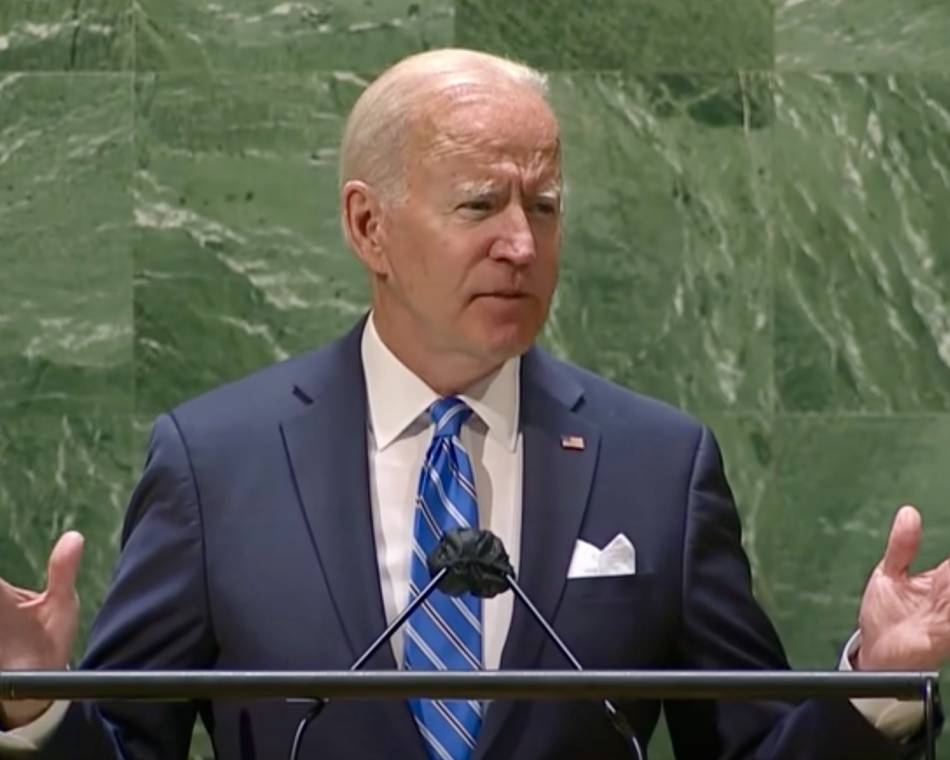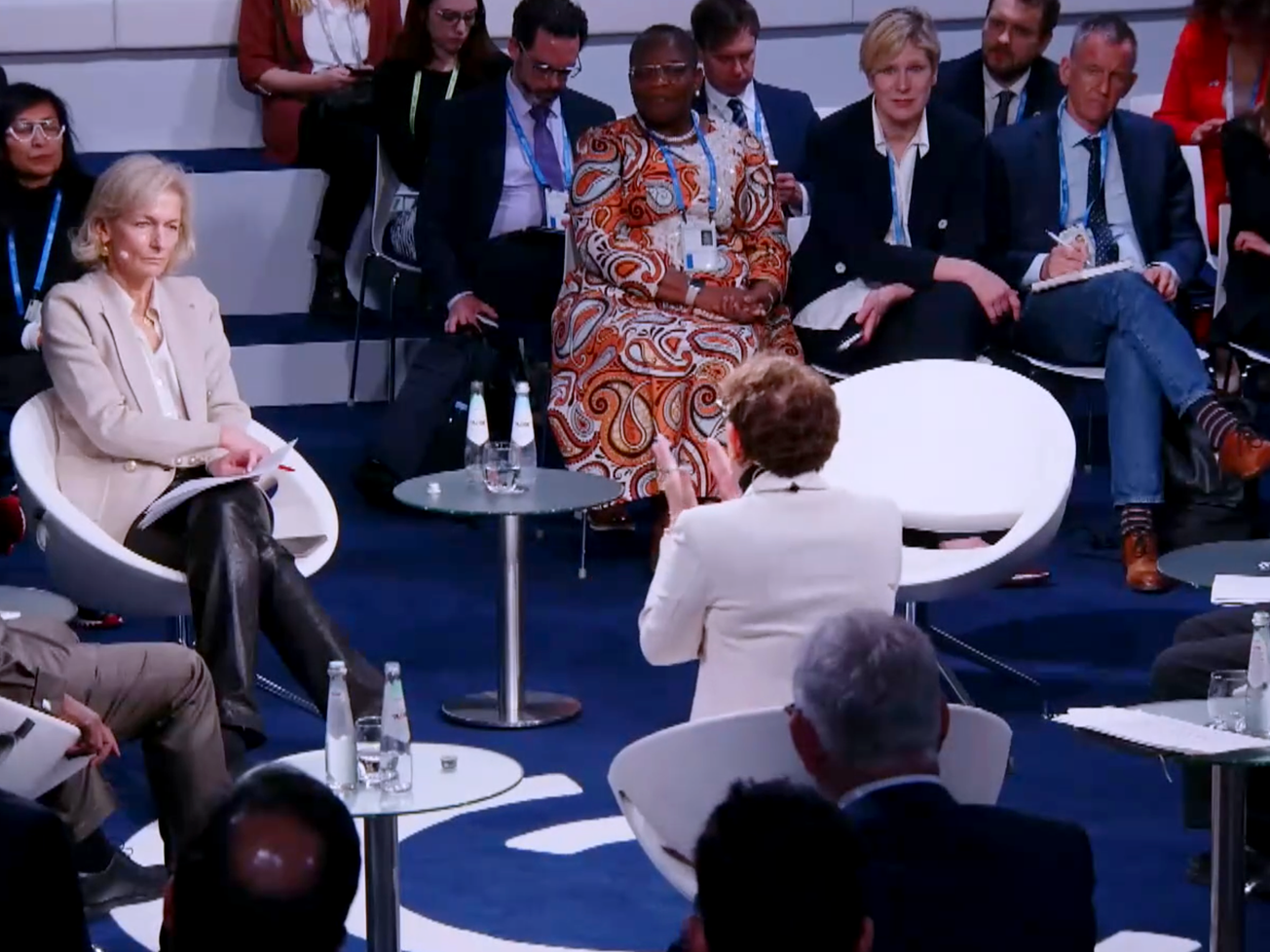UNITED NATIONS (AN) — U.S. President Joe Biden used his first address to the U.N. General Assembly to reassure other nations his administration is committed to multilateralism, declaring that after 20 years of “relentless war, we’re opening a new era of relentless diplomacy.”
Little more than a month after the Taliban's seizure of Afghanistan's capital as U.S. and NATO forces withdrew, Biden sought to ease heightened transatlantic strains and put the U.S. on firmer ground with its allies. The Afghanistan withdrawal and four years of former President Donald Trump's antagonistic foreign policy has caused dissension among NATO nations.
"We’ve ended 20 years of conflict in Afghanistan. And as we close this period of relentless war, we’re opening a new era of relentless diplomacy; of using the power of our development aid to invest in new ways of lifting people up around the world; of renewing and defending democracy; of proving that no matter how challenging or how complex the problems we’re going to face, government by and for the people is still the best way to deliver for all of our people," Biden said.
The world stands "at an inflection point in history," Biden said, as it grapples with the deaths of more than 4.5 million people from the COVID-19 pandemic, the existential threat of the climate crisis, and other global challenges.
"Instead of continuing to fight the wars of the past," he said, "we are fixing our eyes on devoting our resources to the challenges that hold the keys to our collective future: ending this pandemic; addressing the climate crisis; managing the shifts in global power dynamics; shaping the rules of the world on vital issues like trade, cyber, and emerging technologies; and facing the threat of terrorism as it stands today."
Opening the 194-nation General Assembly's first in-person gathering of world leaders in two years, U.N. Secretary-General António Guterres issued an urgent call to action.
"I am here to sound the alarm: The world must wake up. We are on the edge of an abyss — and moving in the wrong direction. Our world has never been more threatened. Or more divided. We face the greatest cascade of crises in our lifetimes," he said. "The COVID-19 pandemic has supersized glaring inequalities. The climate crisis is pummeling the planet. Upheaval from Afghanistan to Ethiopia to Yemen and beyond has thwarted peace."
Guterres said a surge of mistrust and misinformation is polarizing people and paralyzing societies, while vaccine inequity poses more injustice and instability.
"Human rights are under fire. Science is under assault. And economic lifelines for the most vulnerable are coming too little and too late — if they come at all. Solidarity is missing in action — just when we need it most," he said. "A majority of the wealthier world vaccinated. Over 90% of Africans still waiting for their first dose. This is a moral indictment of the state of our world. It is an obscenity."
Sagarmediainc
— Naresh Kumar Sagar (@Nksagar) September 21, 2021
UN HQ in New York for the annual General Assembly. The high-level General Debate starts on September 21 and lasts until September 27.
US President Joe Biden, who will make his first address to the 193-member world body since he took office. pic.twitter.com/zJxVM6mmT1
Upholding 'universal principles'
Along with Biden, who appeared at the United Nations complex along the East River in New York for the first time since he won the 2020 presidential election, China's President Xi Jinping and Iran's President Ebrahim Raisi delivered the other most eagerly anticipated speeches through video conferencing.
Xi's speech contituted an appeal to developing countries to help China use its growing economic power to create an international order no longer dominated by the United States and the West, though he spoke of a world "big enough" to accomodate all nations' ambitions.
"Right now, COVID-19 is still raging in the world, and profound changes are taking place in human society. The world has entered a period of new turbulence and transformation. It falls on each and every responsible statesman to answer the questions of our times and make a historical choice with confidence, courage and a sense of mission," Xi said.
"Differences and problems among countries, hardly avoidable, need to be handled through dialogue and cooperation on the basis of equality and mutual respect," he said. "One country's success does not have to mean another country's failure, and the world is big enough to accommodate common development and progress of all countries."
Raisi, a conservative cleric and former judiciary chief newly sworn in last month as president after an election, harshly criticized U.S. policies and sanctions imposed on Tehran. “Sanctions are the U.S.’ new way of war with the nations of the world,” he said. “From the Capitol to Kabul, one clear message was sent to the world: the U.S.' hegemonic system has no credibility, whether inside or outside the country."
In his speech, Biden called for unity — particularly among Western democratic nations — in the face of emerging technological threats and rifts in the international order through confrontation with autocratic nations such as Russia and China.
"As a global community, we’re challenged by urgent and looming crises wherein lie enormous opportunities if — if — we can summon the will and resolve to seize these opportunities," Biden said. "Will we apply and strengthen the core tenets of the international system, including the U.N. Charter and the Universal Declaration of Human Rights, as we seek to shape the emergence of new technologies and deter new threats? Or will we allow these universal — those universal principles to be trampled and twisted in the pursuit of naked political power?"
Biden ticked off a list of international organizations and treaties his administration has mended ties with after Trump's hostilities and threats to cool or sever ties: NATO, the European Union, Association of Southeast Asian Nations, African Union, Organization of American States, World Health Organization, 2015 Paris Agreement, U.N. Human Rights Council, 2015 Joint Comprehensive Plan of Action, known as the Iranian nuclear deal, and the Group of Seven wealthy democracies.
"And as the United States seeks to rally the world to action, we will lead not just with the example of our power but, God willing, with the power of our example," he pledged. "Make no mistake: The United States will continue to defend ourselves, our Allies, and our interests against attack, including terrorist threats, as we prepare to use force if any is necessary, but — to defend our vital U.S. national interests, including against ongoing and imminent threats."
Finally, the United States "will champion the democratic values that go to the very heart of who we are as a nation and a people: freedom, equality, opportunity, and a belief in the universal rights of all people," he pledged before the General Assembly, the main policy-making body of the United Nations. "It’s stamped into our DNA as a nation. And critically, it’s stamped into the DNA of this institution."







